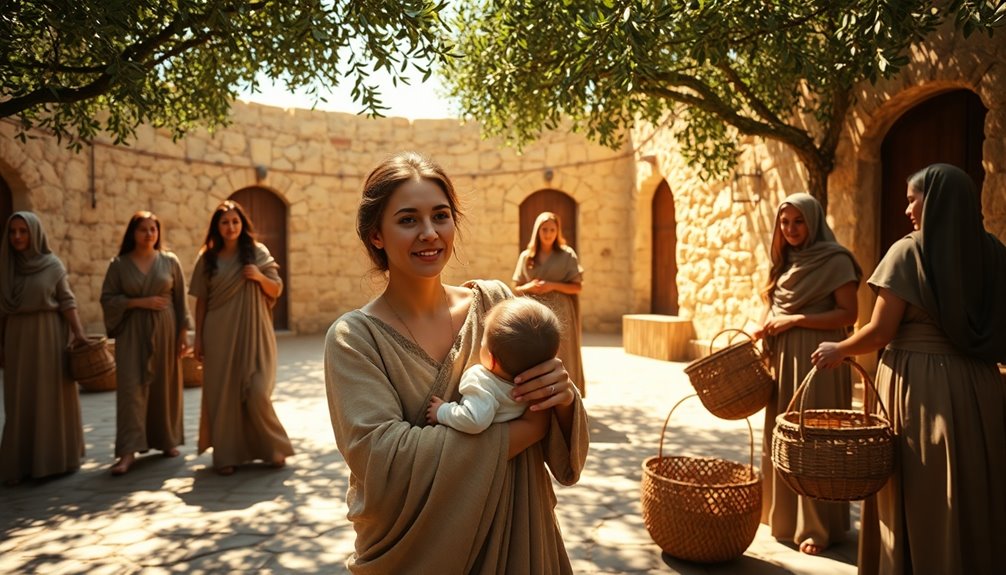Joanna was a pivotal figure in the Bible, known for being healed by Jesus from evil spirits and diseases. As the wife of Chuza, a steward of Herod Antipas, she had connections to authority. Joanna actively supported Jesus' ministry, traveling with Him and contributing financially, which was uncommon for women of her time. She was also one of the first to witness the empty tomb and encountered angels, affirming the resurrection. Her life exemplifies the important roles women played in early Christianity, and you might discover more about her lasting impact on faith communities.
Key Takeaways
- Joanna was a follower of Jesus, healed from evil spirits and diseases, and actively supported His ministry alongside the apostles.
- She was the wife of Chuza, steward of Herod Antipas, indicating her connections to the ruling elite.
- Joanna was one of the first witnesses of the empty tomb and played a crucial role in the resurrection narrative.
- She exemplified women's active participation in early Christianity, challenging societal norms by providing financial support for Jesus' ministry.
- Recognized as Saint Joanna the Myrrhbearer in the Orthodox Church, her legacy emphasizes women's significant contributions to faith communities.
Introduction

Joanna, a remarkable figure in the New Testament, emerges as a testament to the transformative power of faith and the vital contributions of women in early Christianity. In the Gospel of Luke, you learn that Joanna was healed by Jesus from evil spirits and diseases, marking a significant transformation in her life.
As the wife of Chuza, steward of Herod Antipas, she'd connections to the ruling class, which provided her access to considerable resources.
Joanna didn't just witness Jesus' ministry; she actively participated in it. You'll find her traveling with Jesus and the apostles, providing crucial financial support—an uncommon role for women of her social status at the time. Her commitment to the ministry showcases her dedication and challenges traditional gender norms.
Joanna was present during critical moments, including the crucifixion and burial of Jesus. She was one of the first to witness the empty tomb, proclaiming the resurrection to the apostles.
Through her life and actions, Joanna exemplifies the essential role women played in early Christianity, emphasizing their contributions to spreading the Gospel and supporting Jesus' mission.
Joanna's Role in Resurrection

Joanna's involvement in the resurrection story is pivotal, as she was one of the first to witness the empty tomb.
In Luke 24, you'll find her alongside Mary Magdalene and others, encountering angels who announce Jesus' resurrection.
Her testimony not only confirms the event but also highlights the vital role women played in the early Christian movement.
Primary Bible References
When we delve into the accounts of Jesus' resurrection, we find Joanna playing a crucial role in the story. Mentioned in Luke 24:10, Joanna is one of the women who discover the empty tomb and deliver the incredible news of Jesus' resurrection to the apostles. Alongside Mary Magdalene and Mary the mother of James, Joanna encounters two angels at the tomb who declare that Jesus has risen (Luke 24:5-7).
Her testimony holds significant weight, underscoring the important inclusion of women in the early Christian narrative. Joanna's presence at the tomb after the crucifixion (Luke 23:55-56) not only demonstrates her loyalty but also highlights her dedication to Jesus, as she'd prepared spices and ointments for His body.
The account of Joanna and her fellow witnesses emphasizes the credibility of their testimony. As some of the first to share the news of the resurrection, these women mark a pivotal moment in Christian history.
Joanna's role reminds us that, in the Bible, women played an essential part in spreading the message of hope and resurrection that would shape the faith of countless believers in Galilee and beyond.
Secondary Bible References
Three significant women, including Joanna, played pivotal roles in the resurrection narrative, highlighting the vital contributions of women in early Christianity. In Luke 24:1-7, you see Joanna alongside Mary Magdalene and Mary, the mother of James, discovering the empty tomb of Jesus. Their encounter with two angels announcing His resurrection marks a critical moment, as these women were among the first to bear witness to this transformative event.
Joanna's testimony, mentioned in Luke 24:10, was crucial. She reported the resurrection to the apostles, emphasizing women's involvement in the foundational moments of Christianity. This act reflects her unwavering loyalty and commitment, as she stood by Jesus during His crucifixion and burial (Luke 23:49, 55).
Moreover, Joanna's role illustrates the broader theme of women's active participation in Jesus' ministry, as highlighted in Luke 8:2-3. Her contributions help shape the early Christian community, and her voice in proclaiming the resurrection underscores the importance of women's testimonies in spreading the Gospel.
Joanna's actions remind you that women were vital to the early church and the message of hope that Jesus' resurrection brings.
First-Century Judean Women's Roles

In first-century Judea, women often found themselves confined to domestic roles, managing households and raising children, which significantly limited their public engagement.
However, despite these societal restrictions, some women in the Bible, such as Joanna, broke traditional norms. They became active participants in religious movements, contributing to the spread of the Gospel.
Women of higher social status, like Joanna, leveraged their resources and connections to provide financial support for ministry efforts. This showcased their potential influence within early Christian communities, challenging the limited roles typically assigned to them.
Joanna's involvement highlights how women could play vital roles in faith and leadership, demonstrating their essential contributions to early Christianity.
The presence of women at key events in Jesus' life, including His crucifixion and resurrection, further indicates a shift in perception.
These women weren't merely passive observers; they actively supported the ministry and were integral to the faith's growth. Their participation reflects a broader narrative of women's roles evolving beyond domestic confines, showcasing their significance in shaping the early Christian experience. Additionally, the unwavering support of unconditional love from these women often motivated their dedication to Jesus' ministry.
Cultural Significance of Joanna

Joanna's role in the early Christian community exemplifies the cultural significance of women who defied conventional expectations. As a wealthy woman, she actively participated in Jesus' ministry, challenging traditional gender roles. Her connection to Chuza, steward to Herod Antipas, positioned her uniquely, allowing her to bridge the gap between the ruling class and Jesus' followers. This highlights the inclusive nature of the Gospel and the essential support women like Joanna provided.
Joanna was present at pivotal moments, such as the crucifixion and the discovery of the empty tomb, underscoring the vital contributions women made to the early Christian narrative. By prioritizing her faith and service to Jesus over societal expectations, she broke social norms of her time. Her story resonates today, demonstrating how faith can transcend social barriers, encouraging ongoing discussions about gender equality.
Joanna's life inspires recognition of women's roles in faith communities, revealing the depth of their contributions to spiritual leadership and community support. In doing so, she not only transformed her own life but also paved the way for future generations to challenge norms and embrace the call to ministry.
Joanna's Influence on Early Christianity

Joanna's role in early Christianity often gets overshadowed by more prominent figures, but it's crucial to challenge those misconceptions.
You'll find that her contributions, from supporting Jesus financially to being a key witness to the resurrection, highlight her historical significance.
Debunk Misconceptions About Joanna
Frequently overlooked in discussions about early Christianity, Joanna played a crucial role that challenges common misconceptions about women's involvement in the church. As the wife of Chuza, a steward to Herod Antipas, Joanna had unique access to influential circles, enabling her to be a significant supporter of Jesus' ministry. Her contributions weren't limited to financial backing; she provided logistical support essential for the mission.
Joanna's status as a witness to the resurrection further emphasizes her importance. She was among the first to proclaim this pivotal news to the apostles, highlighting women's critical roles in the early church. This challenges the notion that women were mere bystanders in the faith community.
Moreover, Joanna's presence at key events, including the crucifixion and burial of Jesus, showcases her courageous commitment to Christ, defying societal expectations of her time.
The Orthodox Church honors her as Saint Joanna the Myrrhbearer, recognizing her steadfast faith and dedication in a male-dominated context. By acknowledging Joanna's influence, we can appreciate the integral roles women played in shaping early Christianity and dispel outdated misconceptions about their contributions.
Historical Accuracy Concerns
The significant roles women like Joanna played in early Christianity raise important questions about the historical accuracy of their influence. Joanna, the wife of Chuza, steward of Herod Antipas, offers a unique perspective on the intersection of political power and Jesus' ministry. Her financial support highlights how women of high social status contributed significantly to the early church, challenging the traditional gender roles of that time.
Joanna's witness to the resurrection, as recorded in Luke 24:10, showcases her as one of the first evangelists of this pivotal message. Historical interpretations suggest that her involvement inspired other women to engage in ministry, thereby shaping the dynamics and practices of the early church. This challenges the notion that early Christian movements were solely male-driven.
Moreover, Joanna's story often gets overshadowed by male figures in the gospels, which calls for a reevaluation of women's contributions in Christianity. Recognizing Joanna's influence not only enriches our understanding of early Christian history but also emphasizes the necessity of acknowledging diverse voices that played crucial roles in the church's foundation.
Faithful Service in Daily Life

You can see how Joanna's life inspires us to engage in daily acts of kindness and support local outreach initiatives.
Her dedication to serving others teaches us that even small gestures can make a significant impact in our communities. Additionally, embracing challenges as opportunities can lead to personal growth and a deeper commitment to helping those around us.
Daily Acts of Kindness
Embodying daily acts of kindness, Joanna serves as a powerful example of how simple gestures can reflect deep faith and commitment. She used her financial resources to support Jesus and the apostles, highlighting the importance of generosity in serving others (Luke 8:3).
By traveling with them and providing logistical support, Joanna demonstrated faithful service in action, showcasing how caring for others strengthens community bonds.
After Jesus' crucifixion, Joanna returned to the tomb with spices to anoint His body (Luke 23:55–56). This act of love and dedication, even in grief, illustrates that kindness often flourishes in the most challenging times.
As one of the first witnesses to the resurrection, Joanna shared the good news with the apostles, emphasizing the vital role of spreading kindness and hope (Luke 24:10).
Her life encourages you to engage in daily acts of kindness within your own community. By following Joanna's example of support and service, you can make a significant impact on the lives of others, reflecting the principles of faith and generosity that she embodied. Additionally, her story reminds us that, much like the financial needs considered in alimony decisions, our acts of kindness can significantly influence the well-being of those around us.
Let her story inspire you to carry out acts of kindness each day.
Supporting Local Outreach Initiatives
In the spirit of faithful service, supporting local outreach initiatives can profoundly impact your community. Just like Joanna, who used her wealth to aid Jesus and the apostles, your financial contributions can meet urgent needs and foster hope.
Joanna's presence during pivotal moments, such as the crucifixion and resurrection, reminds you that active engagement and support are crucial in spreading the Gospel.
Joanna's journey from aristocracy to devoted follower illustrates that anyone, regardless of their background, can engage in meaningful service. By participating in outreach initiatives, you not only contribute materially but also embody the spirit of community and service that Joanna exemplified.
Her hands-on involvement inspired many to join in local efforts, proving that commitment is key.
Moreover, as one of the first witnesses to the resurrection, Joanna showcased the power of sharing testimonies in outreach. Your stories and experiences can encourage others to join the mission of bringing healing and hope to your community.
Joanna's Enduring Legacy Today

Joanna's enduring legacy as a pivotal figure in early Christianity resonates strongly today, particularly as she's celebrated as Saint Joanna the Myrrhbearer in various Christian traditions. Her contributions to the early church and the resurrection narrative highlight the vital roles women played in biblical history, inspiring believers to reevaluate women's positions in church leadership and ministry.
In contemporary faith communities, Joanna's story serves as a catalyst for discussions on gender equality, encouraging you to consider how women's contributions can be recognized and valued. As you explore her life, you'll see that she exemplified the transformative power of faith and service, urging modern believers to actively engage in their communities and support the spread of the Gospel.
Cultural representations of Joanna in literature and television further underscore her ongoing relevance, showcasing her impact on conversations about women's roles in Christianity today.
Additional Resources

To deepen your understanding of Joanna's role in the Bible and her impact on early Christianity, several valuable resources are available. Start by exploring the Gospel of Luke, specifically Luke 8:1-3, where you'll find Joanna, the wife of Cuza, the steward of Herod Antipas. This passage highlights her healing by Jesus and her financial contributions to His ministry, showcasing her influence within the early Christian community.
For a deeper dive, consider reading scholarly articles that discuss Joanna's presence at significant events, including her role as a witness to the resurrection at the empty tomb (Luke 24:10). These discussions emphasize women's involvement in the early church and highlight Joanna as a potential precursor to later female leaders.
Additionally, you might want to look into Orthodox traditions that honor her as Saint Joanna the Myrrhbearer, commemorated on the Sunday of the Myrrhbearers.
These resources will enhance your appreciation of Joanna's contributions to ministry and provide insights into the vital role women played in spreading the Gospel. By exploring these materials, you'll gain a richer perspective on Joanna's lasting legacy in Christianity.
Frequently Asked Questions
What Was Joanna in the Bible Known For?
Joanna's known for her unwavering support of Jesus' ministry and her transformation after being healed by Him.
You see, she didn't just follow; she actively contributed with her resources. Her dedication shines through as she witnesses key events, like the crucifixion and resurrection.
When you think of early female followers, Joanna stands out as a vital figure, embodying loyalty and faith, and showing how women played an essential role in spreading the Gospel.
What Happened to Joanna in the Bible?
You'll find that Joanna experienced a profound transformation after Jesus healed her from evil spirits and diseases.
She actively supported His ministry, traveling with Him and the apostles while using her resources to help.
Joanna witnessed significant events, including Jesus' crucifixion and burial.
Most notably, she discovered the empty tomb, becoming one of the first to share the news of His resurrection with the apostles.
Her contributions greatly impacted early Christianity.
What Lessons Can We Learn From Joanna in the Bible?
You can learn valuable lessons from Joanna's story. It shows you the importance of prioritizing faith over societal expectations and using your resources to support meaningful causes.
Her courage during challenging moments reminds you to stand firm in your beliefs. Additionally, Joanna's role in sharing the resurrection news highlights the power of inclusive participation in spreading God's message.
Ultimately, her journey encourages you to seek healing and become a vessel for faith.
Who Was Joanna in the Bible Married To?
Joanna was married to Chuza, who managed Herod Antipas' estate. This connection provided her access to wealth and influence, which she later used to support Jesus' ministry.
Their marriage reflects a partnership where both shared values and goals. You can see how Joanna's commitment to her faith allowed her to navigate her societal status while prioritizing her beliefs.
It's a powerful reminder of how personal convictions can shape life choices, even in challenging circumstances.










